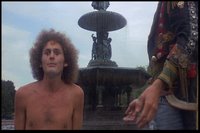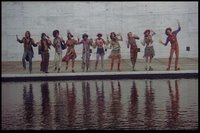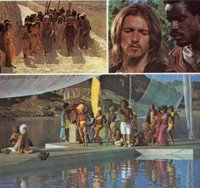Comparison: Good Samaritan
 Last week I looked at various Jesus film portrayals of Jesus' Gospel Manifesto from Luke 4, as part of trying to find a suitable clip for a session on Luke I'm taking. I also want to include a clip of the Parable of the Good Samaritan, so I thought I add a few notes here as well (times indicate the point at which the relevant clip begins).
Last week I looked at various Jesus film portrayals of Jesus' Gospel Manifesto from Luke 4, as part of trying to find a suitable clip for a session on Luke I'm taking. I also want to include a clip of the Parable of the Good Samaritan, so I thought I add a few notes here as well (times indicate the point at which the relevant clip begins).Kings of Kings (1961) - 1:28:20
Whilst Ray's Jesus is one who speaks about "peace, love and the brotherhood of man", the story part of the Parable of the Good Samaritan is missing. All that is left if the question "I'm a camel driver, who can I call my neighbour?" and Jesus' answer "He to whom you show mercy and compassion, whether you know him or not. This is all part of the Sermon on the Mount scene.
Godspell (1973) - 35:08
One of Godspell's strengths is the way it creatively re-tells the parables, reflecting the fact that when Jesus first spoke them there was a freshness and vitality about them. Here the Godspell trope act out the story with their hands. There's a slight change to the characters here, We get a priest, a judge along with the Samaritan, rather than a priest and a Levite. Curiously however there's a suggestion that the Samaritan is drunk.
At the end of the parable, the Samaritan is then hoisted onto someone's shoulders and paraded along until Jesus interjects with Matt 6:2-5 ("So when you give to the needy, do not announce it with trumpets...").
Il Messia (1975)
This is the only film to show Jesus telling the parable in standard fashion. In fact it's a fairly unremarkable sequence, in keeping with the off-hand way Rossellini has Jesus deliver much of his teaching. Sorry I didn't note down the starting time for this one.
Jesus (1979) - 60:48This was, for me, the most memorable moment. Initially we see Jesus being questioned as per Luke, but then there's a watery dissolve into a dramatised version of the story. It's wordless, accompanied instead by a incredibly memorable little jingle, before we dissolve back to Jesus and the crowd. A couple of points here. Firstly, all three of those who approach the beaten man do within a very short period of time. This keeps the story brief, but it does rather let the first two off the hook to a small extent. The road looks busy, so the hurrying by looks less like desertion and dereliction of duty than it looks like simply leaving it to someone else. Secondly, here it's a woman who asks Jesus the initial question rather than an expert in the law which makes the scene softer and less confrontational. Likewise it's a young girl, not the original questioner, who answers Jesus' closing question, leading Jesus into "suffer the little children" passage.
Mary, Mother of Jesus (1999)
This version has Mary telling Jesus the story as a boy in keeping with the high view of Mary the film has. Jesus ends by asking "so the Samaritan was good?" to which Mary, rather curiously replies "yes, even though he was a Samaritan". The scene following this one links in, showing Jesus getting beaten up by a group of boys but refusing to fight back.
Miracle Maker (2000) - 45:50
This is one of the sections in this puppet animated film that switches to 2D, hand drawn animation, and it's done in a rather angular spiky style, which might actually be quite scary to younger children. It also explains some of the cultural reference points such as how the priest believed it made him unclean to touch a dead body, the Jewish people's hatred of the Samaritans (even showing one the children shouting out that he hates them). In the context of the film this is probably my favourite portrayal, but for a free-standing clip I don't think it would work so well.
So none of these are ideal really. What I probably will do instead is show the Mitchell and Webb version of the story, which never fails to amuse me, and ties in somewhat with Mary's response in Mary, Mother of Jesus
Labels: Godspell, Il Messia, Jesus (1979), King of Kings, Mary Mother of Jesus, Miracle Maker
































